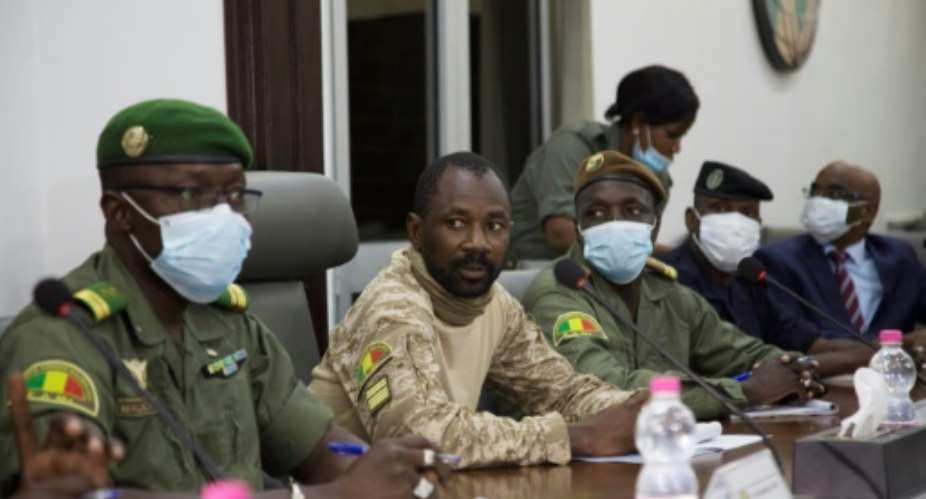Malian Colonel Assimi Goita triggered a diplomatic storm this week by detaining the war-torn Sahel state's president and prime minister and stripping them of their powers.
It marked the second apparent military coup in Mali within one year.
President Bah Ndaw and Prime Minister Moctar Ouane had led a caretaker government installed after military officers deposed elected president Ibrahim Boubacar Keita on August 18.
What has happened?
After the August coup, Mali's military handed power to a nominally civilian interim government under the threat of international sanctions.
This government pledged to pave the way to returning civilian rule, saying it would stage elections within 18 months.
But the army retained tight control. Coup leader Colonel Assimi Goita was appointed interim vice president.
On Monday, the interim government announced a ministerial reshuffle amid mounting criticism of the military's influence on state affairs.
 Mali's interim president, Bah Ndaw, at his inauguration last September. By MICHELE CATTANI (AFP/File)
Mali's interim president, Bah Ndaw, at his inauguration last September. By MICHELE CATTANI (AFP/File)
The defence and security ministers -- who were both leaders of the August coup -- were set to be replaced as part of the reshuffle.
About two hours after the government announced the reshuffle, soldiers arrested President Ndaw, Prime Minister Ouane, and several other senior officials.
The military released them on Thursday after having stripped them of their powers.
Why did this happen?
Baba Cisse, a special advisor to Goita, pointed to a "deep division" with Ndaw.
He accused him -- but without offering evidence -- of interfering with election preparations and of blocking the arrest of officials suspected of corruption.
But the government reshuffle seems to be the underlying motive.
Cisse, without specifying details, said the interim government had chosen "dismissals or abusive changes".
Who runs Mali?
Mali's military has promised to appoint a new president and new interim government.
Goita's office said on Thursday that the coup leader would lead the country in the meantime, however.
The process to appoint a new government nonetheless appears underway. Officials from Malian political parties and civil society have been meeting army officers since Monday.
The opposition M5 movement, which spearheaded protests against Keita last year, has been sidelined since the August coup.
However, M5 cadre Choguel Kokalla Maiga is believed to be in the running to become the new prime minister in the new government.
How have Malians reacted?
Malians, for the most part, have wearily accepted the military ouster of the president and prime minister.
Calls to protest have met with almost no response. The Journal du Mali, a leading newspaper, said in an editorial on Thursday that "nothing has changed".
 A man prepares coffee at Bamako's central market. Many Malians have reacted wearily to the latest twist in the long-running crisis. By Michele Cattani (AFP)
A man prepares coffee at Bamako's central market. Many Malians have reacted wearily to the latest twist in the long-running crisis. By Michele Cattani (AFP)
Much of the country's divided political class has also adopted a wait-and-see attitude.
Boubacar Haidara, a researcher at France's Bordeaux Montaigne University, said the army would win popular support for the rest of the transition period if it appointed an M5 member to government.
What are the consequences?
The United Nations, European Union, African Union, the Economic Community of West African States (ECOWAS), the United States and Britain all condemned the army's arrest of the president and prime minister.
Washington also announced that it will end its military aid to Mali. Both the US and the former colonial power France have also threatened sanctions.
But Mali's neighbours are concerned about destabilising an already fragile country, where a brutal jihadist conflict has raged since 2012.
ECOWAS sent a mediation mission to Mali's capital Bamako this week, but it left without making a statement.
The 15-nation West Africa bloc, whose sanctions helped to push the junta to form the interim government, is also due to hold a summit on Mali on Sunday.
The International Crisis Group (ICG) think tank said on Thursday that Mali's military could allay international concerns by appointing a prime minister from the M5 movement.





 Akufo-Addo’s assurance of not interfering in Election 2024 lacks substance – Fif...
Akufo-Addo’s assurance of not interfering in Election 2024 lacks substance – Fif...
 Labadi beachfront: I’m ready to meet you in court – Ablakwa dares Blay family
Labadi beachfront: I’m ready to meet you in court – Ablakwa dares Blay family
 Plastic manufacturers threaten shutdown over 5% excise tax
Plastic manufacturers threaten shutdown over 5% excise tax
 NDC is focusing on winning 2024 polls, unfazed about opponents — Abu Kansangbata
NDC is focusing on winning 2024 polls, unfazed about opponents — Abu Kansangbata
 Electoral Commission to extend voter registration to prison inmates
Electoral Commission to extend voter registration to prison inmates
 Defamation Suit: Manasseh Azure grilled on journalism background, legal knowled...
Defamation Suit: Manasseh Azure grilled on journalism background, legal knowled...
 Bimbilla: 18-year-old boy dies in Police Cell in Chamba, family suspects foul pl...
Bimbilla: 18-year-old boy dies in Police Cell in Chamba, family suspects foul pl...
 Cement prices: KT Hammond slams Chamber of Cement Manufacturers’ CEO over petiti...
Cement prices: KT Hammond slams Chamber of Cement Manufacturers’ CEO over petiti...
 SSNIT Board Chair Elizabeth Ohene replies Ablakwa over sale of four hotels
SSNIT Board Chair Elizabeth Ohene replies Ablakwa over sale of four hotels
 National Peace Council backs EC’s move to use Ghana Card for voter registration
National Peace Council backs EC’s move to use Ghana Card for voter registration
